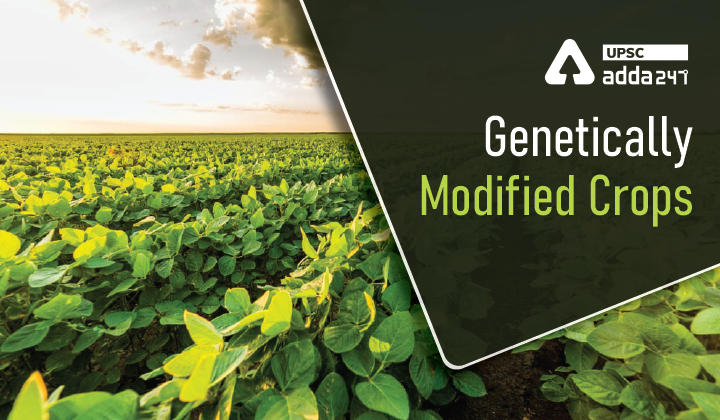Table of Contents
Bt cotton UPSC: Relevance
- GS 3: Awareness in the fields of IT, Space, Computers, robotics, Nano-technology, bio-technology
GM crops in India: Context
- Recently, Haryana Govt has issued a NOC (No Objection Certificate) to seed major Mahyco to conduct field trials on BG-2 RRF, which is an herbicide tolerant and insect resistant variety of BT cotton.
Bt cotton farming in Haryana: Key points
- The NOC was granted last month for trials to be conducted during the coming kharif harvest season.
- Till date, India has allowed commercial use of BG-1 and BG-2 GM cotton in the country while the approval for the BG-2 is pending at various stages.
- BG-2 RRF can provide protection against devastating pest attack such as American Bollworm.
- A few months ago, the union government had exempted certain types of genome-edited crops from the stringent regulations applicable on genetically modified or GM crops.
- In the recent years, many countries have either developed or approved for commercial cultivation of vegetables, fruits, oilseeds and cereals developed through genome editing.
- Recently, China too has approved guidelines for genome editing that will spur research into crops that have high yields and are resistant to pests and climate change.
Guidelines for Safety Assessment of Genome Edited Plants : Key points
- The ‘Guidelines for Safety Assessment of Genome Edited Plants, 2022’ exempt researchers who use gene-editing technology to modify the genome of the plant from seeking approvals from the Genetic Engineering Appraisal Committee (GEAC).
- The guideline is a road map for the development and sustainable use of genome editing technologies in India, specifying the biosafety and/or environmental safety concerns, and describing the regulatory pathways to be adopted while undertaking the genome editing of plants
- The guidelines say that all requirements that researchers must adhere to, to develop transgenic seeds will apply to gene-edited seeds except clauses that require permission from the GEAC.
- These guidelines are expected to bring transformational change in product development and commercialisation and would contribute towards increasing farmer’s income.
- The guidelines define various categories of genome edited plants and determine regulatory requirements for appropriate categories and provide the regulatory framework and scientific guidance on data requirement in context of development of these crops.

What is BT cotton?
- BT cotton is a genetically modified crop that has been developed by the insertion of one or more genes from a common soil bacterium, Bacillus thuringiensis.
Advantages of BT cotton
- Increases yield of cotton due to effective control of three types of bollworms, viz. American, Spotted and Pink bollworms.
- Insects belonged to Lepidoptera (Bollworms) are sensitive to crystalline endotoxic protein produced by Bt gene which in turn protects cotton from bollworms.
- Reduction in insecticide use in the cultivation of Bt cotton in which bollworms are major pests.
- Potential reduction in the cost of cultivation (depending on seed cost versus insecticide costs).
- Reduction in predators which help in controlling the bollworms by feeding on larvae and eggs of bollworm.
BT cotton issues
- Growing a BT crop is expensive than the natural process.
- Environmentalists argue that the genetic modification process can disrupt the natural process of gene flow.
- The pests—for which the modification was done earlier—might become resistant to the toxins produced by these crops and the crop production might decline.
What is GM crops?
- Genetic Modification (GM) is a technology that involves DNA insertion into the genome of an organism.
- Genetic modification (GM) technology allows the transfer of genes for specific traits between species using laboratory techniques.
- A GM or transgenic crop is a plant that has a novel combination of genetic material obtained through the use of modern biotechnology.
Read current affairs for UPSC
| “CiSS Application” under the Baal Swaraj Portal Launched | India-Vietnam Relations: India and Vietnam Sign Mutual Logistics Agreement | India Ocean Mission in 2023 | Green Open Access Rules 2022 |
| Sustainable Development Report 2022 | Biotech Start-up Expo 2022: BIRAC | Rapid Increase in India’s Trade with Gulf Cooperation Council | National Strategy for Sustainable Tourism, Responsible Traveller Campaign |
| Ex Khaan Quest 2022 | National Tribal Research Institute (NTRI): To be Inaugurated as part of Azadi Ka Amrit Mahotsava | Growing Heavy Metal Pollution in Rivers | India’s International Cooperation in disability sector- An Overview |
| Ethanol Blending in India: India Achieved 10% Target Ahead of Schedule | Leaders in Climate Change Management | Understanding Gun Control Legislation in Various Countries | SHRESHTA Scheme Launched |




 TSPSC Group 1 Question Paper 2024, Downl...
TSPSC Group 1 Question Paper 2024, Downl...
 TSPSC Group 1 Answer key 2024 Out, Downl...
TSPSC Group 1 Answer key 2024 Out, Downl...
 UPSC Prelims 2024 Question Paper, Downlo...
UPSC Prelims 2024 Question Paper, Downlo...




